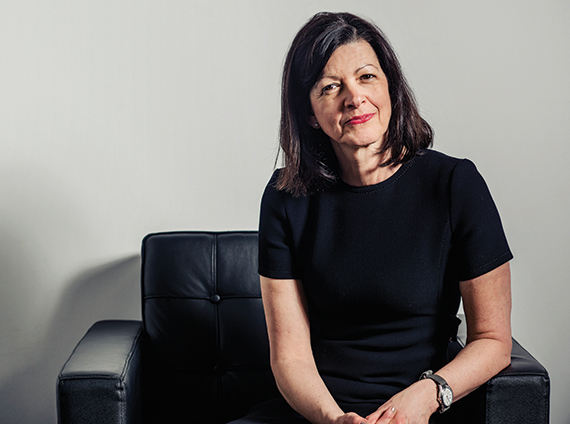 An interview with the head of a major property services group might be expected to include discussions on the sales and lettings market and criticism of government hikes in stamp duty and landlord taxes. But not when it comes to Alison Platt.
An interview with the head of a major property services group might be expected to include discussions on the sales and lettings market and criticism of government hikes in stamp duty and landlord taxes. But not when it comes to Alison Platt.
Instead, an interview with Platt – chief executive of Britain’s largest agency group, Countrywide – focuses on three key words: customers, retail and change.
The reason is simple. While plenty of Countrywide’s 12,500 staff can talk about asking prices and rental yields, Platt and her radically reshaped senior team are dedicated to turning this highly traditional group into a customer-focused 21st century retail giant.
Not that it was doing badly before Platt, 53, joined in autumn 2014. In that year, the group’s total income rose by 20% to more than £700m and it handled about one in 10 of the country’s residential sales, thanks to its 50 high-street estate agency brands, ranging from Hamptons to Gascoigne-Pees, and Miller Countrywide to John D Wood & Co.
But like many property firms at the top of the industry, its past success is not considered a guarantee of its future progress. So change is required.
“The changes that retailers have gone through in recent years are immense and largely positive. The world now bases its view of business on the quality of experience they encounter in a transaction,” says Platt, drawing on her previous roles at Bupa, British Airways and Cable & Wireless, among others.
“What our people must realise is that we should not aim to be better than some other estate agent down the road. Instead, we must be better than other services and other businesses. We’ll be compared to all kinds of firms, not just property ones,” she says.
This philosophy underpins the fundamental restructuring of the organisation that has happened during Platt’s 18-month tenure. Last summer, she recruited Samantha Tyrer – former retail and services director at Dixons Carphone – to turn Countrywide’s disparate sales and lettings teams into one business division, known as Retail.
October saw the exit of some senior managers – many with the firm for 30 years or more – and new roles created for retail commercial director, retail programme director and retail performance director. The next layer includes 12 regional heads, called retail directors. Meanwhile, Countrywide’s London activities – 400 sales and lettings operations trading in 250 branches – are now under one business unit.
This year started with key staff from Hamptons International, John D Wood and Ikon joining commercial services group Lambert Smith Hampton at UK House on London’s Oxford Street – a symbol of “one organisation”, with 500 top Countrywide personnel in one place. Then came Countrywide’s new chairman, Peter Long – outgoing chairman of Royal Mail with substantial travel and leisure sector roles behind him.
A stark shortage of estate agency experience among senior new recruits and a long-term drop in Countrywide’s share value from 680p in spring 2014 to less than 330p earlier this year, have prompted criticism. Last summer, former Countrywide chief executive Harry Hill took to Twitter to say his firm was “going backwards”.
Platt is unrepentant and by no means uncritical of the firm she has inherited.
“There are real pockets of brilliance in this organisation, and there is an absolute correlation between the brilliant performers and the profitability and sustainability of those sections,” she says. “But it’s not consistent and not joined up and we’re on a journey to achieve that across the piece.”
Joining up is next on the agenda for the group, and a series of initiatives announced by Platt illustrates the point.
First, this spring, Countrywide will start a trial in three areas where agency branch staff will be available from 7am until 9pm instead of working what Samantha Tyrer describes as “an antiquated system of nine until six and not on Sundays – or even sometimes not on Saturday afternoons”. Staff will be available to visit clients’ homes and will advise on more than just one activity, such as selling or letting a property.
“We’ve got such an advantage because of our size,” says Platt. “And we need to offer that to our customers, so if they want a valuation because they’re selling to buy a bigger home, perhaps instead they might consider remortgaging to afford a conservatory on their existing property. We can help with that.”
The staff operating the trial may have been recruited with one skill – as a lettings agent or surveyor, for example – but they will have what Countrywide calls “blended skills” to offer customers the full range of the group’s services.
Second, Countrywide is entering the thorny arena of online agency – but again, joining up all its services, not simply creating a website for sales or rentals in what is a crowded marketplace for budget online transactions.
“We are behind the curve when it comes to delivering mobile and digital technology to customers,” admits Platt. She says there was pressure on her to buy an existing online agency, but instead Countrywide is buying into two tech start-ups which Platt says can be moulded to create digital platforms for the wider range of the group’s activities.
However, she firmly believes that although “digital enablement” of the customer is important, most people want to sell, let or manage their properties after a face-to-face engagement with locally based professional experts.
Platt also favours the status quo in that other online area – property portals.
Countrywide is a minority shareholder in Zoopla, which a year ago looked under threat from OnTheMarket, a rival set up by high-end estate agents. That threat has receded, not least because Countrywide’s own 50 high-street agency brands have remained loyal to Zoopla and Rightmove – the latter now the biggest portal of all by some margin.
“Portals are fantastic,” says Platt. “Our marketing spend is smaller because of them, and we get so many bangs for our buck. But our agents’ support for Rightmove and Zoopla isn’t driven by the group’s stake in Zoopla – it is driven by the number of eyeballs on these portals compared to any other. It’s a no-brainer.”
The rest of Platt’s agenda is still consumed by innovation, however.
She has just become a non-executive director of Tesco and says: “There is so much we can learn from how Tesco works, in its branches and in digital, how it is customer-focused.” And Helen Normoyle, former BBC director of marketing and audiences and chief marketing officer at furniture store DFS, has arrived as Countrywide’s marketing and customer services director.
As well as heralding more change, Normoyle’s arrival will consolidate Countrywide’s new-found reputation as a company serving as an exemplar for gender equality at its top table as well as in its workforce. “We employ the best, whatever their gender, but the data we have shows women play a very key role in customer decisions regarding property, so it is appropriate we should have a balanced board too,” says Platt.
Platt’s portfolio
Age 53
Career
• 14 years at British Airways, starting as a management trainee and later becoming an air stewardess
• 20 years at Bupa in senior roles, including chief operating officer
• September 2014 Joined Countrywide as chief executive
• Since 2015 non-executive director of Cable & Wireless Communications, as of this year, non-executive director at Tesco
Other roles
• 2005-2010 Non-executive director of the Foreign & Commonwealth Office
• 2009-2013 chair of Opportunity Now, seeking to accelerate change for women in the workplace
• 2011 Appointed a Commander of the Order of St Michael and St George for services to the board of the FCO
Lifestyle
Lives in Teddington, married with two stepsons and one son











